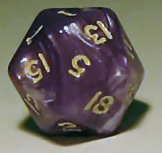Details
When a test is required, the Gamemaster, names the skill which is going to be tested (or a raw attribute, if no skill is available for the activity the character is trying to perform). He also sets a difficulty level for the test, which modifies the attribute value (reducing or improving it). Then, the character's skill level is taken into account - if the character does not have any skill levels in the given skill, (in case of Neuroshima) the difficulty level is raised by one, or (in case of Monastyr), all the three rolls (not two) have to be lower than the tested attribute. Otherwise, the player can subtract a total of his character's skill levels in that skill from any of the three dice rolls, each separately.
Difficulty levels
| Difficulty level | Attribute modifier | Difficulty level | Attribute modifier | Difficulty level | Attribute modifier |
|---|
| Easy | + 2 | Problematic | - 2 | Very difficult | - 8 |
| Average | 0 | Difficult | - 5 | Extremely difficult | - 11 |
Special rules
- Suwak ("Slider") is a special rule of this game system. It says that when a character has at least four 4 levels in a skill, each time that skill is tested, the difficulty level is automatically lowered by one; if their skill level is 8 or 12, then difficulty is lowered by two or three levels respectively. It's supposed to depict the fact that the more trained a character becomes, the easier those things they trained seem to them.
- Lucky 1 - each time when making a test roll a player rolls "1" on any dice, he is lucky and manages to perform easily; in the terms of mechanics, the test is treated as if the difficulty level was lower by one. Notice: if the player rolls two "1's", the test is automatically successful.
This page is based on this
Wikipedia article Text is available under the
CC BY-SA 4.0 license; additional terms may apply.
Images, videos and audio are available under their respective licenses.
